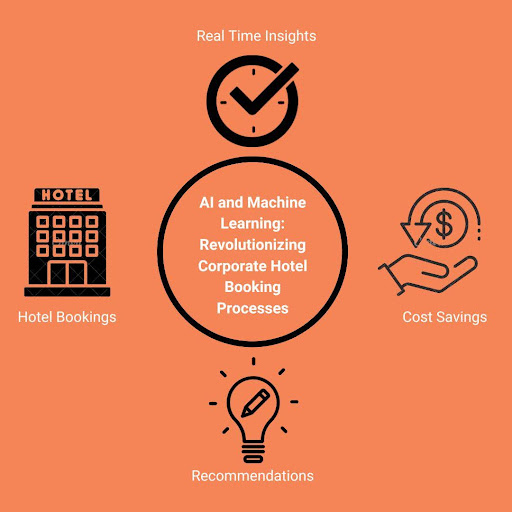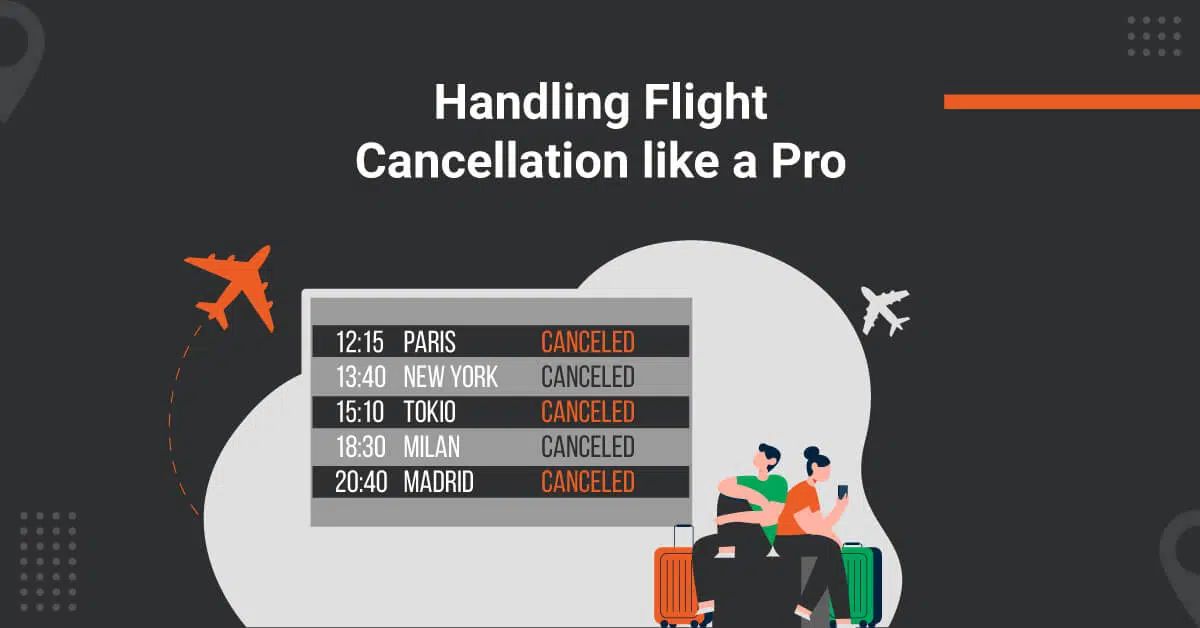
In today’s fast-paced corporate world, travel management has become increasingly complex. Managing accommodations for corporate travelers, especially on a large scale, involves juggling numerous factors such as budget constraints, traveler preferences, availability, and company policies. Companies are turning to artificial intelligence (AI) and machine learning to streamline this process and improve efficiency.
These technologies are revolutionizing how corporate travelers book hotels, offering benefits such as enhanced cost savings, real-time booking insights, and personalized travel experiences.
The adoption of AI in travel management is on the rise, with the global market for AI in the travel industry projected to reach $1.2 billion by 2026, growing at a compound annual growth rate (CAGR) of 4.20% during 2023-2032. Additionally, a report reveals that businesses using AI to manage travel operations have seen a reduction in travel costs by 20-30%.
As corporate travelers demand efficiency and customization, AI and machine learning are positioned to redefine travel management, simplifying the corporate hotel booking process and ensuring smoother operations for companies of all sizes.
AI Streamlining Corporate Hotel Booking Processes
1. Automating Routine Booking Tasks
The first significant benefit of AI in travel management is its ability to automate routine and repetitive tasks involved in booking hotels. Traditionally, booking a hotel requires travelers or travel managers to search multiple websites, compare prices, and manually enter booking details. AI eliminates much of this time-consuming process through automation. Travel management platforms integrated with AI can instantly search and compare hotel options across various platforms, presenting the best choices to the user.
AI-powered tools, such as virtual assistants or chatbots, help simplify booking. These tools can handle hotel availability, pricing, and reservation inquiries. For instance, chatbots can guide travelers through the booking process, allowing them to select dates, locations, and preferences while ensuring the hotel aligns with company policies. This automation speeds up the booking process and reduces the risk of human error.
2. Learning from Previous Bookings
Another prominent feature of AI in travel management is its ability to learn from previous bookings. Machine learning algorithms analyze travelers’ behavior and preferences to offer more accurate and personalized hotel options for future bookings. For example, if a corporate traveler consistently chooses hotels in a specific price range or prefers certain amenities, AI systems can consider this data when offering recommendations. This results in a more seamless booking experience tailored to the traveler’s needs.
AI also ensures that companies remain compliant with internal travel policies. By integrating company policies into the booking system, AI-powered travel tools can automatically filter out hotels that do not meet the company’s standards, ensuring efficiency and compliance.
3. Enhancing Cost Efficiency with AI
- Predicting Price Fluctuations
AI is a powerful tool for driving cost efficiency in travel management. One key advantage is its ability to monitor hotel prices in real-time and predict price fluctuations. Machine learning models analyze past booking trends, seasonal patterns, and market behavior to forecast when hotel prices will likely rise or fall. This predictive capability allows travel managers to decide when to book hotels for corporate travelers.
For example, AI can alert travel managers when hotel prices are expected to drop or when a special discount becomes available. This allows businesses to book accommodations at the most cost-effective times, reducing overall travel expenses. According to a report by companies using AI in travel management operations, it’s shown that travel cost reductions of 20-30% through better booking strategies.
- Negotiating Better Deals
In addition to monitoring prices, AI can assist travel managers in negotiating better deals with hotel chains. By analyzing large volumes of booking data, AI can identify patterns in corporate travel habits, such as frequent stays at particular hotels or chains. Travel managers can leverage this data to negotiate bulk booking discounts or preferred rates with hotels, leading to further cost savings.
AI also provides insights into traveler behavior, allowing companies to adjust their travel policies to encourage cost-saving practices. For instance, businesses can identify whether travelers consistently choose high-end accommodations and introduce new guidelines to promote more budget-friendly hotel choices.

4. Personalized Recommendations for Corporate Travelers
- Tailoring the Booking Experience
Personalization has become a significant factor in modern travel management, and AI plays a crucial role in delivering customized hotel recommendations. Machine learning algorithms analyze traveler preferences, including previous bookings, favorite hotels, preferred room types, and even proximity to critical locations such as airports or meeting venues. Based on this data, AI systems generate personalized hotel suggestions that meet both the traveler’s preferences and the company’s travel policies.
For corporate travelers, this personalized approach enhances the overall travel experience. Rather than receiving generic hotel options, travelers are presented with recommendations tailored to their needs, reducing the time spent searching for suitable accommodations. A study by Deloitte found that 57% of travelers expect personalized services, and AI is essential to meeting this growing demand.
- Improving Traveler Satisfaction
Personalized hotel recommendations improve the booking process and increase traveler satisfaction. When corporate travelers have access to hotels that align with their preferences—location, amenities, or room features—they are more likely to have a positive travel experience. This boosts morale and productivity, particularly for frequent travelers who spend extended periods away from home.
AI systems can also adapt over time, learning from traveler feedback and preferences to offer even more refined recommendations in the future. This continuous improvement ensures that each booking is more tailored than the last, enhancing both convenience and satisfaction.
5. The Role of Data Analytics in Corporate Hotel Booking
- Leveraging Data for Smarter Decisions
AI and machine learning rely heavily on data analytics to optimize the travel management process. By analyzing large datasets, AI systems can provide actionable insights into booking trends, traveler behavior, and hotel pricing. These insights help travel managers make smarter, data-driven decisions about corporate hotel bookings.
For example, travel managers can use AI-generated reports to track average booking costs, hotel occupancy rates, and traveler satisfaction levels. This data allows businesses to identify areas for improvement, such as encouraging travelers to book hotels earlier or selecting more cost-effective accommodations.
- Real-Time Insights for Travel Managers
AI provides insights from historical data and delivers real-time analytics that allow travel managers to react quickly to changing circumstances. Whether it’s monitoring sudden price changes, tracking hotel availability, or responding to last-minute booking requests, AI systems ensure that travel managers always have up-to-date information.
Real-time data can also monitor traveler behavior and identify potential compliance issues. For instance, if a traveler books a hotel that exceeds the company’s approved budget, AI-powered alerts can notify the travel manager, enabling them to take corrective action before the booking is finalized.
The Future of AI in Corporate Travel Management
AI and machine learning are revolutionizing corporate hotel booking processes, allowing businesses to streamline operations, reduce costs, and enhance traveler satisfaction. From automating routine tasks to providing personalized recommendations, AI is transforming travel management in once unimaginable ways.
As AI evolves, we can expect even more sophisticated tools and features to emerge, further optimizing the corporate travel experience. Companies that adopt AI-driven solutions for hotel bookings will be better equipped to navigate the complexities of corporate travel, ensuring a more efficient, cost-effective, and personalized approach to travel management.













 and then
and then